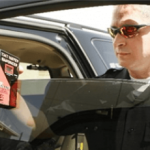OPINION
PER CURIAM.
Petitioner, Sterling Heights Police Department, appeals by right from an order of the circuit court that vacated a series of four previously entered ex parte orders which, pursuant to the forfeiture provisions of the Controlled Substances Act, MCL 333.7101 et seq., seized property and froze assets belonging to respondents. We affirm.
This case began when a confidential informant working with petitioner stated that respondent Lawrence Kozlowski was repackaging and selling drug samples to local pharmacies. Police subsequently executed a search warrant on respondent's home, finding and seizing a large quantity of prescription drugs, as well prescription drug labels, a personal computer with a label printer, repackaged drug samples, empty plastic drug bottles, drug inventory lists and tax returns.
A Sterling Heights Police Detective and a United States Food and Drug Administration Special Agent then interviewed a pharmacist who admitted purchasing repackaged drug samples from respondent, a pharmaceutical sales representative, at prices forty percent lower than wholesale. Next, petitioner submitted an emergency ex parte motion to freeze various accounts, attaching the state warrant and an affidavit as evidence of probable cause to believe that the identified property was related to respondent's alleged violations of the Controlled Substances Act. The motion was granted, as were three similar motions over the next two weeks. In all, these motions froze accounts and seized assets of respondents Lawrence Kozlowski, his wife Josephine Kozlowski, and his sister Margaret Kozlowski (a/k/a Margaret Brubaker).
Respondents filed a motion to vacate the circuit court's ex parte orders, arguing that the orders were unlawfully entered because the search of respondents' home failed to reveal any controlled substances. Petitioner opposed the motion, arguing that Lawrence Kozlowski was part of a criminal operation to repackage and resell prescription drugs, and contending that there was probable cause to believe that respondents had violated sections of the Controlled Substances Act "OTHER THAN AND IN ADDITION TO controlled substance violations." Petitioner cited various provisions of the act allegedly violated.
Following a hearing, the circuit court ruled that the seizure of respondents' property "was an illegal seizure to begin with" because the Controlled Substances Act only authorized seizure related to controlled substances, classifications of which did not include the prescription drugs at issue. Accordingly, the circuit court vacated its four ex parte seizure orders. The court noted, however, that this order was to have no effect on federal seizures of respondents' property, which had occurred as the result of a parallel investigation. 1 The court denied petitioner's motion for reconsideration, and petitioner appealed.
1 Federal authorities had seized most of the same property pursuant to alleged violations of the broader provisions of Title 18 U.S.C. and Title 21 U.S.C., under which the federal authorities were investigating respondents in connection with a health care fraud scheme.
Petitioner argues that the circuit court erred in vacating the ex parte orders, contending that the trial court mistakenly construed the forfeiture statute, MCL 333.7521(1)(f), by improperly applying a strict construction and erroneously concluding that an offense must be directly related to a "controlled substance" to afford petitioner the opportunity to seize assets. We disagree.
This Court reviews a trial court's decision regarding relief from its judgment for an abuse of discretion. Redding v Redding, 214 Mich App 639, 643; 543 NW2d 75 (1995). However, the trial court's findings of fact in a forfeiture proceeding are reviewed for clear error. In re Forfeiture of $ 19,250, 209 Mich App 20, 29; 530 NW2d 759 (1995). Furthermore, this Court reviews de novo a trial court's interpretation of a statutory provision. In re MCI Telecommunications Complaint, 460 Mich 396, 413; 596 NW2d 164 (1999); Hollins v City of Detroit Police Dep't, 225 Mich App 341, 344; 571 NW2d 729 (1997).
Although forfeiture is generally disfavored, it is well established that, as part of the Public Health Code, the forfeiture provision, MCL 333.7521, is to be liberally construed "to promote the health, safety, and welfare of Michigan's citizens." In re Forfeiture of $ 19,250, supra at 26-27; In re Forfeiture of One 1987 Chevrolet Blazer, 183 Mich App 182, 184; 454 NW2d 201 (1990). However, where due process rights are implicated, the forfeiture provision should be strictly construed to ensure that a claimant's due process rights are protected. Hollins, supra at 347; In re Forfeiture of $ 19,250, supra at 27.
In pertinent part, the forfeiture provision of the Controlled Substances Act provides:
(1) The following property is subject to forfeiture:
* * *
(f) Any thing of value that is furnished or intended to be furnished in exchange for a controlled substance, an imitation controlled substance, an androgenic anabolic steroid, or a counterfeit androgenic anabolic steroid in violation of this article or section 17766a that is traceable to an exchange for a controlled substance, an imitation controlled substance, an androgenic anabolic steroid, or a counterfeit androgenic anabolic steroid in violation of this article or section 17766a, or that is used or intended to be used to facilitate any violation of this article or section 17766a including, but not limited to, money, negotiable instruments, or securities. To the extent of the interest of an owner, a thing of value is not subject to forfeiture under this subdivision by reason of any act or omission that is established by the owner of the item to have been committed or omitted without the owner's knowledge or consent. Any money that is found in close proximity to any property that is subject to forfeiture under subdivision (a), (b), (c), (d), or (e) shall be presumed to be subject to forfeiture under this subdivision. This presumption may be rebutted by clear and convincing evidence. [MCL 333.7521(1)(f).] 2
It is undisputed that respondents were repackaging prescription drugs, which do not fall within the definition of "controlled substance" in the Controlled Substances Act. 3 Accordingly, respondents' assets are not subject to forfeiture as "any thing of value that is furnished or intended to be furnished in exchange for a controlled substance," or as "any thing of value . . . that is traceable to an exchange for a controlled substance." However, the parties dispute whether respondents' assets are subject to forfeiture as "any thing of value . . . that is used or intended to be used to facilitate any violation of this article."
2 The statute was amended effective January 1, 2001, to extend to any thing of value related to the exchange of any "other drug."
3 The Public Health Code defines "controlled substance" as "a drug, substance, or immediate precursor included in schedules 1 to 5 of part 72." MCL 333.7104(2). The substances listed as schedule one through five drugs are codified at MCL 333.7212, MCL 333.7214, and MCL 333.7216,MCL 333.7218, and MCL 333.7220, respectively. Petitioner does not claim that any of the prescription drugs found in respondents' house were included in the statutory list of controlled substances, and implicitly concedes that they were not drugs defined as controlled substances.
Petitioner contends that it is entitled to seize an individual's assets pursuant to MCL 333.7521(1)(f) for any violation of Article 7, the Controlled Substances Act. By petitioner's reading of the statute, this authority extends to violations unconnected to controlled substances. Petitioner argues on appeal that such violations include: acts contrary to MCL 333.7306, MCL 333.7321, MCL 333.7407, and MCL 333.7407a. 4 Petitioner, however, provides no authority for the argument that respondents violated the foregoing provisions and we are unable to understand how petitioner could reach such a conclusion. Section 7306 governs the issuance of licenses for manufacturing or selling controlled substances and prohibits a licensed manufacturer or distributor from dealing with schedule one or two controlled substances not listed on his or her license. Section 7321 imposes record keeping requirements on individuals licensed to manufacture and distribute controlled substances. Section 7407, in part, makes it a violation to knowingly or intentionally furnish fraudulent information or make a material omission in any document or record required to be kept related to the manufacture or sale of controlled substances. Section 7407a prohibits any attempt to violate the Controlled Substances Act and also prohibits knowingly and intentionally soliciting another to violate the Act. Where the evidence demonstrates, and the parties agree, that respondents were not dealing with controlled substances as defined by the Act, their assets were not subject to forfeiture under any provision identified by petitioner.
4 Before the trial court, petitioner additionally alleged violations of MCL 333.7302, MCL 333.7303, MCL 333.7405, and MCL 333.7507. Petitioner has abandoned these claims before this Court.
Affirmed.
/s/ Martin M. Doctoroff
/s/ William B. Murphy
/s/ Brian K. Zahra





